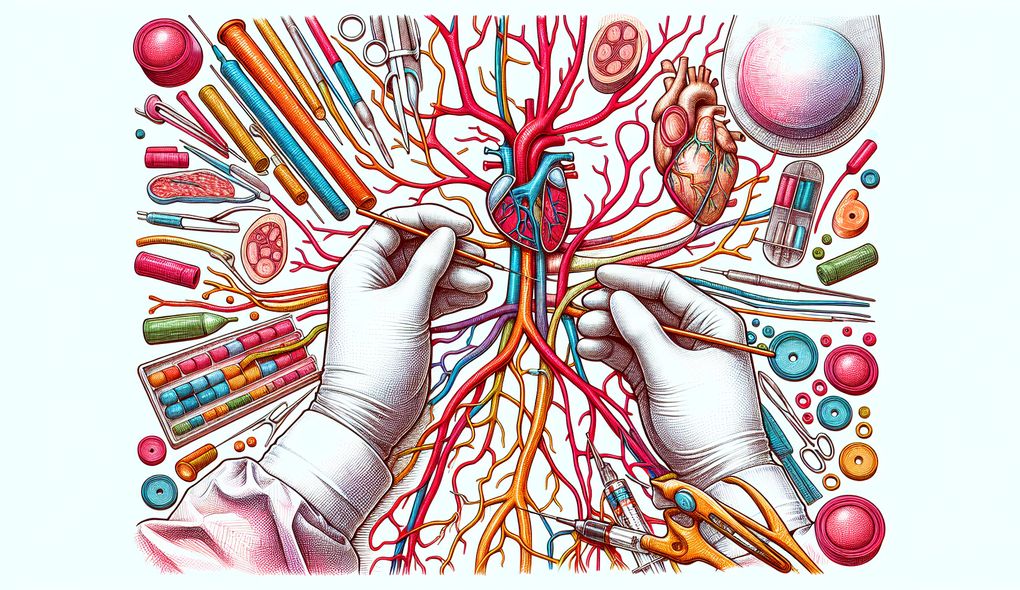How do you keep calm and focused in high pressure surgical situations?
JUNIOR LEVEL

Sample answer to the question:
In high-pressure surgical situations, I keep calm and focused by relying on my strong foundational knowledge of the anatomy and pathophysiology of the vascular system. This allows me to approach the situation with confidence and make informed decisions. I also practice excellent communication skills to effectively collaborate with the surgical team and keep everyone on the same page. Taking deep breaths and focusing on the task at hand helps me maintain my composure and ensure patient safety. Overall, I believe in continuous learning and staying updated with the latest developments in vascular surgery, which helps me stay prepared and composed in high-pressure situations.
Here is a more solid answer:
In high-pressure surgical situations, I keep calm and focused by relying on my strong foundational knowledge of the anatomy and pathophysiology of the vascular system, which I acquired during my medical education and residency training. This knowledge allows me to quickly assess the situation and make informed decisions for optimal patient care. Additionally, I have developed excellent communication skills through my interactions with patients, families, and the healthcare team. Clear and effective communication is essential during high-pressure situations, as it ensures everyone is on the same page and minimizes errors. I also prioritize patient safety above all else, constantly assessing and reevaluating the situation to make sure risks are minimized. Furthermore, I understand the importance of continuous learning and staying updated with the latest developments in vascular surgery. I actively participate in professional conferences, workshops, and research initiatives, which helps me stay current with new techniques and advancements. Finally, I appreciate the value of collaboration in high-pressure surgical situations. I work closely with the surgical team, listening to their input and providing support as needed, to ensure optimal surgical outcomes.
Why is this a more solid answer?
The solid answer expands on the candidate's knowledge of the vascular system and how they apply it in high-pressure situations. It also emphasizes the importance of communication, patient safety, continuous learning, and collaboration, which are all mentioned in the job description. However, it could still benefit from more specific examples of how the candidate has successfully managed high-pressure surgical situations and handled emergencies.
An example of a exceptional answer:
In high-pressure surgical situations, I keep calm and focused by relying on my strong foundational knowledge of the anatomy and pathophysiology of the vascular system, acquired through my MD degree and residency training. For example, during an emergency aortic dissection repair, my in-depth understanding of the vascular system allowed me to quickly prioritize steps and make informed decisions, resulting in a successful outcome for the patient. Excellent communication skills are crucial in these situations, especially when working with a multidisciplinary team. I actively engage with the surgical team, providing clear instructions and listening to their input, to ensure everyone is aligned and focused. Patient safety is always my top priority, and I continuously assess and monitor the patient's vitals, response to treatment, and potential complications. To stay updated with the latest advancements in vascular surgery, I regularly attend conferences, read research papers, and participate in professional development activities. This knowledge helps me adapt to new techniques and technologies in real-time. Furthermore, collaboration plays a vital role in high-pressure surgical situations. For instance, during a complex endovascular procedure, I worked closely with an interventional radiologist to ensure precise placement and successful outcome. Overall, my ability to keep calm and focused in high-pressure surgical situations is backed by my knowledge, communication skills, commitment to patient safety, continuous learning, and collaborative approach.
Why is this an exceptional answer?
The exceptional answer provides specific examples of how the candidate has applied their knowledge and skills in high-pressure surgical situations. It demonstrates a clear understanding of the job requirements, including the ability to handle emergencies, collaboration with a multidisciplinary team, and commitment to ongoing professional development. The answer also highlights the candidate's ability to make informed decisions and prioritize patient safety. However, it can still be further improved by including more examples and elaborating on the candidate's experience in managing high-pressure situations.
How to prepare for this question:
- Review and reinforce your knowledge of vascular system anatomy and pathophysiology to ensure a solid foundation.
- Practice effective communication skills, including clear and concise instructions and active listening.
- Stay updated with the latest developments in vascular surgery by attending conferences, reading research papers, and participating in professional development activities.
- Reflect on past experiences in high-pressure surgical situations and identify specific examples to illustrate your ability to handle pressure.
- Consider seeking opportunities to collaborate with other healthcare professionals through interdisciplinary projects or simulations to enhance your teamwork skills.
What are interviewers evaluating with this question?
- Knowledge of vascular system anatomy and pathophysiology
- Communication skills
- Ability to make informed decisions under pressure
- Continuous learning and staying updated
- Ability to collaborate with surgical team
- Patient safety

